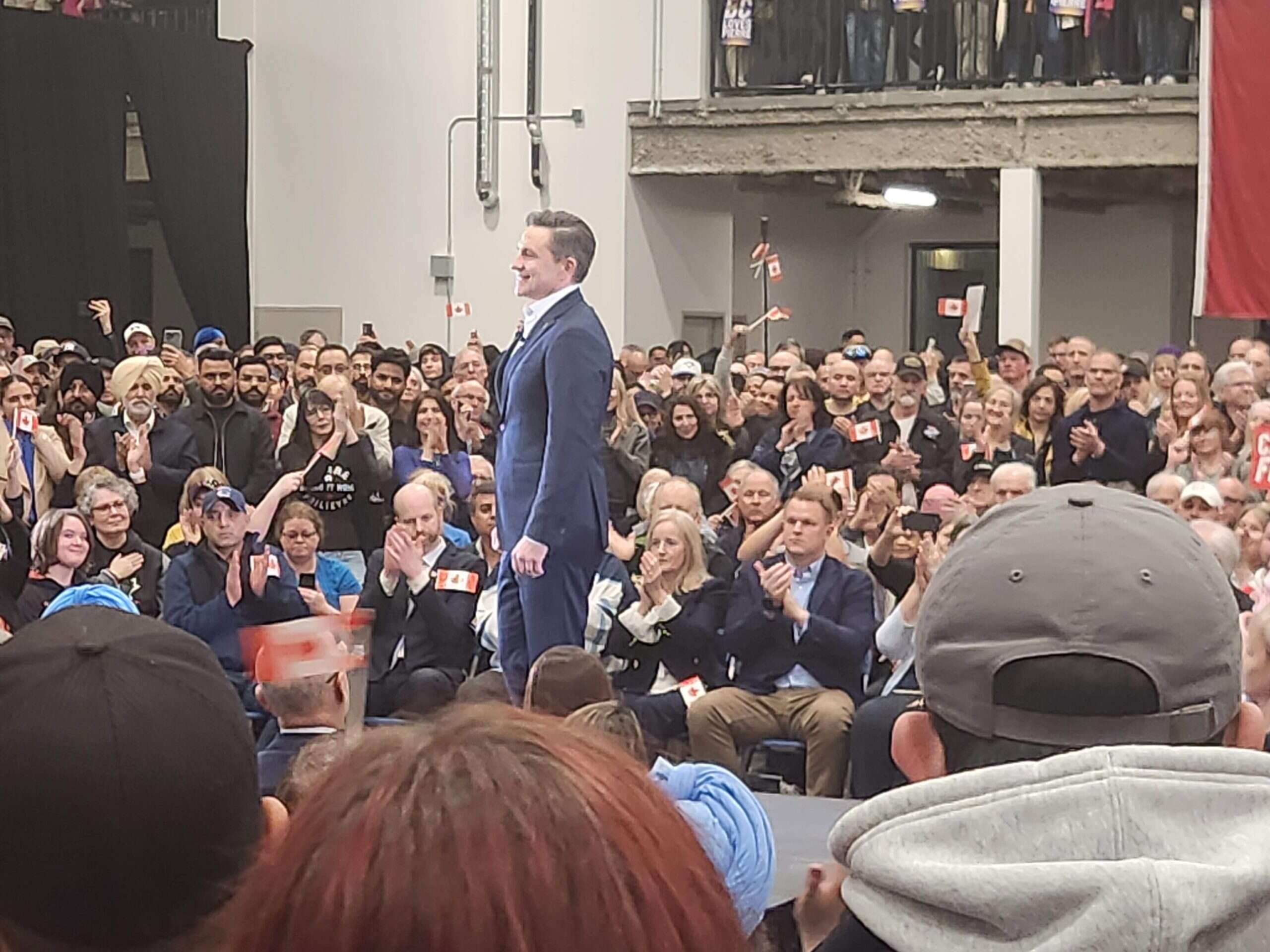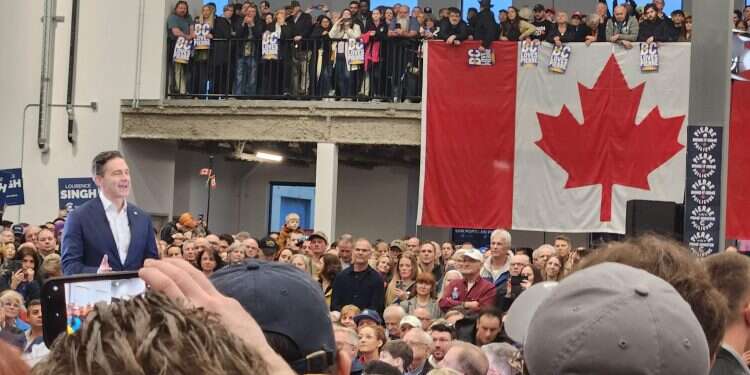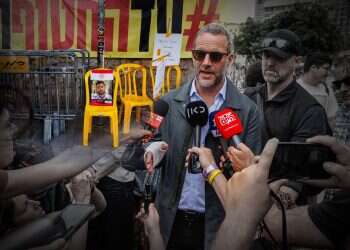Conservative Party leader Pierre Poilievre joked to thousands of supporters on Thursday, "Both Donald Trump and the Liberals want Canadians to pay taxes," while speaking from an aircraft hangar in Surrey, a key Vancouver suburb.
Video: Pierre Poilievre speaks in the rally / Erez Linn
This quip, delivered during his first major rally in western Canada, revealed the unique dilemma facing the man who until recently was the overwhelming favorite to become Canada's next prime minister: his true opponent isn't Liberal Party leader and current Prime Minister Mark Carney, but rather American President Donald Trump – ironically, someone who would typically be considered Poilievre's ideological ally.

With Trump's characteristic unpredictability, the US president has essentially declared economic war on Canada in recent weeks. Through tweets and press conferences, the 47th president has launched a barrage of tariffs, annexation threats, and other provocations that strike at Canada's sensitive position – a nation that often feels overshadowed by what Canadians (including Poilievre several times during his speech) refer to as "the neighbor to the south." In response, Thursday's rally was filled with "Canada First" rhetoric, with Poilievre and his wife Anaida repeatedly urging supporters to "hold on for one month, because hope is on the way." The message was clear: on April 28, Conservatives will take power and protect Canada from American aggression after what Poilievre described as "ten years of Liberal stagnation."
Video: Pierre Poilievre arriving at the rally / Erez Linn
The event drew thousands to an industrial hangar, situated beside manufacturing plants emitting strong chemical odors (large fans inside the venue prevented the smell from permeating the space). Surrey's strategic importance stems from its politically divided parliamentary seats, making it fertile ground for swing voters.
The overwhelming response forced organizers to change venues at the last minute, as registrations poured in at unprecedented rates. Even the hastily secured hangar proved insufficient for the crowd size. At the nearby Tim Hortons cafe, attendees complained between coffee sips that Poilievre should have booked a stadium instead.
Raymond, who traveled specifically for the rally from a neighboring town and met his friend Nav at the event, explained they came because of their belief in Poilievre. Nav's presence represents a significant political conversion – he was previously a Justin Trudeau supporter, which is typical of most provincial residents. "Everyone here is either NDP [the socialist left-wing party] or Liberal," Nav explained.
Video: Pierre Poilievre holding a kid at the rally / Credit: Erez Linn
Nikola, a finance professional who immigrated to Canada from Serbia in his youth and enthusiastically supports Poilievre, offered a scathing assessment of the current government: "We've had 10 years of complete economic collapse with the Liberals." He expressed particular concern about Prime Minister Carney, calling him a "disaster for England" who "brought Britain to bankruptcy" during his tenure as central bank governor. When questioned about polls showing Poilievre's advantage slipping, Nikola disputed their accuracy and issued a stark warning: "If Carney wins, Alberta will separate" – referring to growing independence movements in western provinces frustrated by federal policies. His conclusion was emphatic: "Poilievre has real solutions. Carney doesn't."
Video: Pierre Poilievre speaks in the rally / Erez Linn
One of the evening's most resonant moments came when Poilievre shared a personal story from his youth. While vacationing with his parents, he wanted to rent a jet ski on a lake, but his father would only permit him to rent a paddle boat – making him "the laughingstock" among peers. "My dad told me to go to work and then come back to the lake," Poilievre recalled with a smile. "It taught me something important: if you want something in life, you have to work for it."
Tyler, a mechanic whose political engagement increased during the COVID pandemic, explained he supports Poilievre because of their similar backgrounds. "Poilievre himself, he embodies courage. He comes from humble roots," Tyler noted.
Video: Pierre Poilievre at the rally speaking against Trump / Credit: Erez Linn
In his address, Poilievre emphasized that Prime Minister Carney – who has successfully cultivated a reassuring, fatherly image since replacing Justin Trudeau just weeks ago – is merely performing a role. While this persona resonates with Canadians concerned about Trump's erratic behavior, Poilievre insisted that only Conservatives possess the knowledge and determination to protect Canada, noting they had prioritized Canadian industries and manufacturing long before Trump's return to the White House.
Recent polling indicates voters who had abandoned the Liberals are returning in significant numbers, drawn by confidence that Carney – with his background as a senior economist and former Bank of England governor – possesses the expertise and stature to engage with Trump as an equal.

Nevertheless, Poilievre maintains the momentum favors his campaign. After what he characterizes as "the Liberals' lost decade," he believes Canadians crave meaningful change. The enthusiastic reception – thunderous cheers when his wife appeared, followed by even louder roars upon his own entrance – suggests genuine grassroots energy behind his candidacy. Throughout the rally, Poilievre repeatedly mocked Carney and the Liberals for advocating more taxes and regulations that he claims suppress Canadian innovation and entrepreneurship.
Video: Pierre Poilievre during the rally / Credit: Erez Linn
The crowd frequently interrupted his remarks with chants of "C-A-N-A-D-A" and the campaign slogan "Bring it home" – a phrase suggested by his wife that he has used for several years. He once explained in a campaign video that the slogan means delivering tangible results and restoring Canadians' control over their future. "The word 'home' has tremendous anthropological significance," he noted.
This first major western Canada rally demonstrated Poilievre's willingness to campaign in traditional Liberal territories. While acknowledging his lead in the polls has evaporated, he expressed confidence that momentum remains on his side. His central argument: once voters recognize that Conservatives offer the backbone and competence needed to address the "lost decade," they will grant him a mandate to govern. Indeed, Poilievre still leads in polls asking who can best tackle economic problems attributed to Trudeau – including Vancouver's status as the world's third most expensive city, inflation rates exceeding those in the US, high taxation, and increasing street crime.
Judging by the energy in this typically quiet Vancouver suburb, Poilievre may have found an effective formula to reintroduce himself and remind voters why Conservatives will prioritize "Canada First." The ultimate question remains whether Trump's continuing provocations will help or hinder Poilievre's ability to deliver this message effectively.




